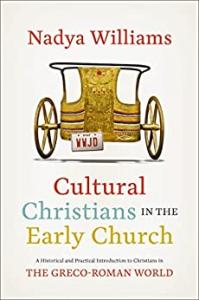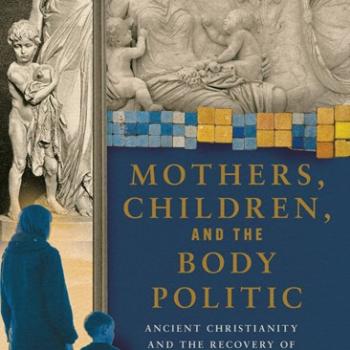Nepotism brought me here.
You see, back in summer 2021, as I was just starting to write some essays for the public, Dan (my husband) graciously ran a couple of them as guest posts here at the Bench. The very first one, in fact, seems remarkably apt now. It was about “Israel and Immigration: A Christian Reflection on the Consequences of Past Sins.” That fall, Dan approached then-blogmeister Chris Gehrz and proposed giving me one of his two monthly slots. Chris approved, and so it happened.
This marks my 29th post for the Bench as a regular contributor—not counting my two guest posts under Dan’s name earlier. This is a farewell, and a very grateful one. I rather like that I will get to round things out with a 30th post this Saturday, in which I will introduce my successor on the Bench, Vangard University history professor and CFHer Mike Jimenez. No nepotism there, by the way—we are not related, unless you count God’s Kingdom, in which we are sons and daughters of the King, brothers and sisters all.
I enjoyed my 2+ years here on the Bench, and I got to write on a variety of topics important to me—like this exhortation for evangelicals to study more military history, but to approach it with theologically-rooted compassion; or this reflection on Bible translations and their future from my perspective as a trained Classicist.
My time here also coincided with the writing of two books, Cultural Christians in the Early Church (Zondervan Academic, November 2023) and Mothers, Children, and the Body Politic: Early Christianity and the Recovery of Human Dignity (forthcoming in late 2024 from IVP Academic).
I appreciated this space to preview some ideas, test-drive others (like this piece on primary sources on Christian women and accidents of source survival), and (to borrow Chris Gehrz’s wonderful term) “think in public” about challenging topics, some of them related to Christianity and gender—e.g., this essay on the Roman Bathsheba or this review of Erika Bachiochi’s important book.
Also, this space allowed me to reflect on some topics related to my Jewish/Israeli roots (e.g., this essay on the commercialization of Hanukkah) and my love for the local church (like this essay on the “children’s ministry draft” at the church where Dan and I were members for seven years before moving this past summer, or this farewell letter to this beloved church).
While writers in this space are in some ways masters of their own destiny—having complete freedom to select topics to write about—there is a sense of working together (like this post on homeschooling that I put together, which included Lisa Diller and Dan, and some non-Benchers), and a community of mutual encouragement and edification. I owe a particular debt of gratitude to Philip Jenkins, the intellectual godfather of this space, whose incredible range as a historian is only rivaled by his kindness to other writers.
In addition, it’s been exciting to see two new pre-modern historians join the Bench in the past year: Lynneth Renberg and Adam Renberg–their addition to the roster also means that my departure will not disrupt the noble tradition of having at least one married couple writing for this blog at all times.
Speaking of that, it has been fun to have this space to collaborate with Dan, my husband and favorite American historian. Sorry, folks, for obvious reasons, there is no competition for that top spot. Regular readers will be glad to know, by the way, that Dan has no plans to leave. So you can look forward to more of his insightful analysis on theological questions and current events in this new year.
It was a particular privilege for me to recruit Ansley Quiros to the Anxious Bench. I have much respect for Ansley’s work, and it has been a selfish joy now to see her write in this space every month.
Finally, this was the space where I made my big career shift announcement. In fact, this essay on vocation and leaving academia ended up being my most-read essay here. I consider this reflection on Dorothy Sayers, by the way, to be a worthy Part II, the consideration of “what’s next.”
So, you may be wondering rightly, what IS next? Why would someone leave a place where they enjoyed writing for nearly 2.5 years? The reason is time. When I first started writing here, I was a full-time academic and this was the only place where I was writing for the public. That is no longer the case. I’ve settled into a rhythm where I have some time to write every day, but my full-time job now is as a homeschooling mom. My writing is very much in the margins of my days, although God has faithfully redeemed these margins. I am now in the early stages of writing for two new book projects–a guide to reading Greco-Roman literature for Christians, and a book on what I have referred to as the pink scandal of the evangelical mind. Also, just over a year ago, I became Book Review Editor for Current, and I now run a blog there, The Arena. My plate is overflowing, and I am so grateful.
For too long I have been operating on an “add-but-never-subtract” model of accepting blessings that flow, and it’s just not feasible anymore. And so, I am choosing to let go of the most academic of my writing obligations—this one—all with the gratitude for the many friends I have met here, and whose work I look forward to continuing to read.















